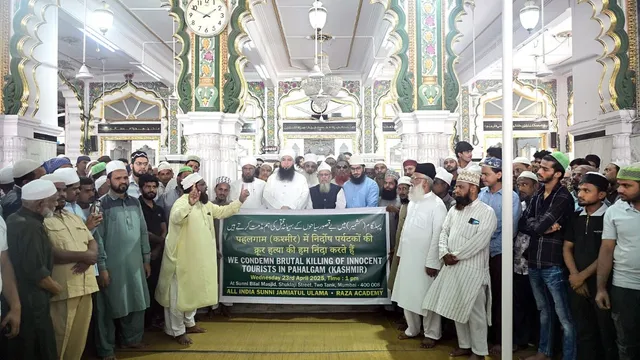- By Shibra Siddiqui
- Thu, 24 Apr 2025 01:52 PM (IST)
- Source:JND
What is kalma in Islam: The survivors of the heinous Pahalgam terror attack, recounting the horror scene, alleged that the attackers enquired about their religious identity and asked them to recite the 'Kalma – the declaration of faith.
A professor from Assam University, Debashish Bhattarcharya, portraying the scene that unfolded in the Baisaran Valley during the attack, said that reciting ‘Kalma’ saved his life as he started reciting Arabic verses when a terrorist walked up to him. The professor was on holiday with his family.
“A terrorist walked up to us and shot the man next to me. Then he looked at me and asked what I was doing. I just recited the Kalma louder and did not reply to his question. I don’t know what happened; he just turned around and left," Bhattacharya was quoted by PTI.
What Is kalma In Islam?
While there are six Kalmas in Islam, the First Kalma, known as Kalma Tayyib, is a declaration of faith and sacred to billions of Muslims around the globe. It is same Kalma that terrorists asked the tourists to recite. The words "La ilaha illallah, Muhammadur rasulullah" mean that there is no god but Allah, and Muhammad is the messenger of Allah. One among the five pillars of Islam, Kalma Tayyaba is the core of Islam and mandatory to be believed in for being a Muslim.
Reciting the Kalma regularly is a way for Muslims to remind themselves of their commitment to worshipping Allah alone and following the teachings of the Prophet Muhammad.
What Are The Six Kalmas In Islam?
There are six Kalmas in Islam, including the first Kalma, which is necessary to be a Muslim, which all Muslims are expected to have learnt by heart. Each of them has meaning and purpose.
First Kalma Tayyib (Purity)
It declares the oneness of Allah and the finality of Muhammad’s prophethood.
Second Kalma Shahadat (Testimony): A testimony of faith, the Kalma Shahadat is often recited at the moment of reflection or when someone accepts Islam.
The words of the second Kalma are “Ashhadu alla ilaha illallah wahdahu la sharika lahu wa ashhadu anna Muhammadan abduhoo wa rasooluhu."
It's translated as “I bear witness that there is no God but Allah; He is One, without any partner, and I bear witness that Muhammad is His messenger."
Third Kalma Tamjeed (Glorification): Recited to praise Allah and his greatness and glory. It expresses gratitude for His mercy and acknowledges His supreme authority. The words of the third kalima are “Subhanallahi walhamdulillahi wa la ilaha illallahu wallahu akbar, wa la hawla wa la quwwata illa billahi aliyil adeem".
This means, “Glory is to Allah, all praise is to Allah, there is no God but Allah, and Allah is the Greatest. There is no power and no strength except with Allah.
Fourth Kalma Tawheed (Unity): Recited to reinforce the core of monotheism, rejecting any partnership or attributes attributed to others besides Him. The words of the fourth Kalima are “Laa ilaha illal lahoo wahdahoo la shareekalahoo lahul mulko walahul hamdo yuhee wa yumeeto wa hoa haiy yul la yamooto abadan abada zul jalali wal ikraam beyadihil khair. Wa howa ala kulli shayi in qadeer"
This translates as “There is none worthy of worship except Allah. He is alone and has no partner. To Him belongs the Kingdom, and for Him is all praise. He gives life and causes death. In His hand is all good, and He has power over everything."
Fifth Kalma Astaghfar (Penitence): As it is clear from the name, the Kalma emphasises the importance of seeking forgiveness, highlighting the mercy of Allah that he forgives every sin when genuine repentance is made. Kalma Astagfar is recited for seeking pardon for both known and unknown sins.
The words of this Kalma are “Astaghfirullah rabbi min kullay zambin aznabtuho amadan ao khat an sirran ao alaniatan wa atubu ilaihee min az zambil lazee aalamo wa min az zambil lazee la aalamo innaka anta allamul ghuyoobi wa sattaarul oyobi wa ghaffar uz zunoobi wala ha ola wala quwwata illa bila hil aliyil azeem."
This is translated as “I seek forgiveness from Allah, who is my Creator and Cherisher, from every sin I committed knowingly or unknowingly, secretly or openly. I also seek His forgiveness for all sins which I am aware of or am not aware of. Certainly, You (O Allah!), are the Knower of the hidden and the Concealer of mistakes and the Forgiver of sins. And there is no power and no strength except Allah, the Highest, the Greatest."
Sixth Kalma Radde-Kufr (Rejecting Disbelief): Recited to reject polytheism and declare allegiance to Allah, the words of this Kalma are 'Allahumma innii a’udhu bika min an ushrika bika shai-anw- wa ana a’lamu bihii. Was tagh fi ru ka limaa laa alamu bihee. Tubtu anhu wa tabarra-tu min al-kufri wash-shirki wal-kizdhbi wal-ghiibati wal-bid’ati wan-namiimati wal-fawaahishi wal-buhtani w-al-ma’aasii kulliha. Wa aslamtu wa aquulu La illaha illAllahu Muhammadur RasulAllah".
It means, “O, Allah! I seek refuge in You from the fact that I should ascribe any partner with You knowingly. I seek Your forgiveness for the sin of which I have no knowledge. I repent from it. And becoming disgusted by disbelief and idolatry, lying and backbiting, innovation and slander, lewdness and abomination, and all other acts of disobedience, I submit to Your will."

